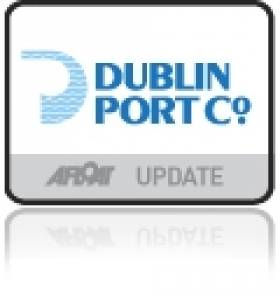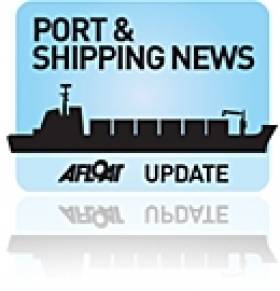Displaying items by tag: Port Training Programme
#DublinPort - Dublin Port Company has welcomed 30 participants from the following African states; Ghana, Indonesia, Nigeria as well as the Philippines for the United Nations Port Training Programme.
Trade for Trade will host a training of trainers' workshop for the English-speaking network of its Port Training Programme (PTP). The workshop will be held in Dublin, Ireland in collaboration with Dublin Port Company.
The workshop will provide training to 30 senior port managers from Ghana, Indonesia, Nigeria and the Philippines who have been selected to serve as local and regional instructors for the English-speaking network of the PTP.
In particular, the managers will receive training on the content of the first four (out of eight) training modules of UNCTAD's Modern Port Management course. Following the workshop, they will lead the delivery of these modules within the framework of the PTP in their respective port communities.
The programme will be opened by Maureen O Sullivan TD tomorrow at Dublin Port Company's head office, the Port Centre on Alexandra Road.
Minister Joe Costello, Minister of State at the Department of Foreign Affairs and Trade with responsibility for Trade and Development will close the programme on 3 April 2014. The programme is part of Dublin Port Company's Corporate Responsibility Programme (CSR)
UNCTAD's TrrainForTrade Port Training Programme supports port communities in developing countries in pursuit of efficient and competitive port management practices. In order to increase trade flows and foster economic development, the programme creates port networks, bringing together public, private and international entities.
The aim is to share knowledge and expertise between port operators, and strengthen talent management and human resources development in port communities.
The English-speaking network of the programme (there are also French-, Portuguese- and Spanish-speaking networks) has been active since 2008 and is now in its third cycle.
Ports that have participated in the programme have been from Ghana, Indonesia, Maldives, Malaysia, Namibia, Nigeria and the Philippines.
Irish Aid has provided funding for the English-speaking network since its creation (the African and Asian member ports also contribute financially), and Dublin Port Company has been a port partner of the network since the beginning.
As a port partner, Dublin Port Company hosts training events, such as this Training of Trainers workshop. They also provide the time and expertise of their senior managers, who travel to the member ports in Africa and Asia, where they deliver the different modules of the programme alongside local senior managers (who have been trained as instructors).
The Port of Cork, Belfast Harbour Commissioners and Drogheda Port Company have also joined the network as port partners.
The Port Training Programme's scope and objectives were specifically designed for middle management. On average, 25 middle managers in each member port are selected to participate in the programme per training cycle.
A training cycle consists of 240 hours of instruction divided in eight modules that are delivered over a two-year period. Participants must successfully complete all eight modules and defend a final dissertation in order to receive the UNCTAD Modern Port Management Certificate.
In their final dissertation, the participants identify challenges within their respective ports and propose concrete management solutions. Since 2008, the network has trained 232 middle managers in the participating ports.
The programme's objectives, however, move beyond training. The goal is to assist the member ports in strengthening their human resources development strategies by setting up a sustainable capacity building framework that facilitates the transfer of knowledge from senior to middle managers. Thus, for the programme to be successful there must be a strong commitment and contribution from the member ports' senior managers.
During the first cycle of the programme, UNCTAD sends an expert or a senior manager from one of the port partners, such as Dublin Port Company, to assist in deliver all eight of the programme training modules in the member ports in Africa and Asia.
When a member port moves into the second cycle, this assistance is reduced to 50 per cent, i.e. an UNCTAD expert or senior manager from the port partners is sent for only four out of the eight modules. Outside assistance is reduced with each successive cycle. This ensures that the programme is sustainable and locally owned.
To prepare senior managers from the member ports for their role as instructors, UNCTAD organizes training of trainers (ToT) workshops in collaboration with the port partners. The next ToT workshop will be hosted by Dublin Port Company, from 25 March to 3 April 2014.
During the intensive two-week workshop, 30 selected senior managers from member ports in Ghana, Indonesia, the Philippines and Nigeria will be trained as instructors for the programme. The training will be delivered by UNCTAD experts and senior managers from Dublin Port Company, Port of Cork, Belfast Harbour Commissioners and Drogheda Port Company.
Since the inception of the English-speaking Network of the Port Training Programme in 2008, 192 senior managers have been trained as instructors, replicating the training for 282 middle managers in the port communities of Africa and Asia.
New Cycle of UNCTAD Port Training Programme Approved
#PortTraining – UNCTAD's TrainForTrade Port Training Programme have agreed to implement a third cycle of the course following a conference held in Belfast earlier this month.
Forty-three representatives from UNCTAD, the Irish Government, and the Irish port partners - Dublin Port Company, Port of Cork and Belfast Harbour Commissioners - as well as from port communities in Bangladesh, Ghana, Indonesia, Nigeria, the Philippines and the United Republic of Tanzania, attended the 2013 International Coordination Meeting for the English-speaking network of the TrainForTrade Port Training Programme.
Participants assessed the results of the second cycle (2011-2013), and evaluated the scope for strengthening and expanding the programme. The review session was staged in cooperation with Belfast Harbour Commissioners.
For more on this story visit the United Nations Conference on Trade and Development UNCTAD website.
#TrainForTrade- UNCTAD Candidates have successfully completed final dissertations last month for the TrainForTrade Port Training Programme in Ghana and which also includes Tanzania, as previously reported on Afloat.ie
The dissertations were defended before panels of experts that included representatives from UNCTAD and the Port of Cork, as well as senior managers from Ghana Ports and Harbours Authority (GPHA).
The graduates are middle-level managers from public and private entities operating at the ports of Tema and Takoradi.
UNCTAD's Port Training Programme supports port communities in developing countries in their efforts to provide efficient and competitive port management services.
The English-speaking network of the Port Training Programme is supported by Irish Aid, the Dublin Port Company, the Port of Cork, and the Belfast Harbour Commissioners.
#UNCTADTanzania - Minister of State at the Department of Foreign Affairs and Trade, Joe Costello has completed a visit to the United Republic of Tanzania at which he reviewed the impact of the UNCTAD Port Training Programme.
Ireland has provided extensive support over the years for the Port Training Programme, which is part of UNCTAD's (United Nations Conference on Trade & Development) TrainForTrade technical assistance programme.
Financial support for the training is provided by Irish Aid - the Irish Government's programme of assistance to developing countries. Supporting the programme are the Dublin Port Company and the Port of Cork in addition to the Belfast Harbour Commissioners.
During his official visit to the East African nation, the Minister, met with representatives of Tanzania Ports Authority and toured the port of Dar es Salaam. He and his delegation were received by the Acting Director General of Tanzania Ports Authority, Mr. M. J. Kipande, and his management team.
































































